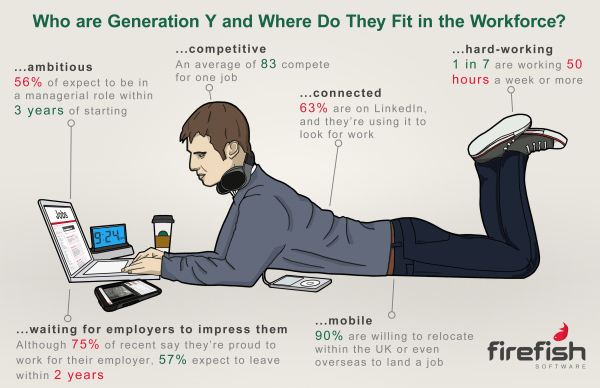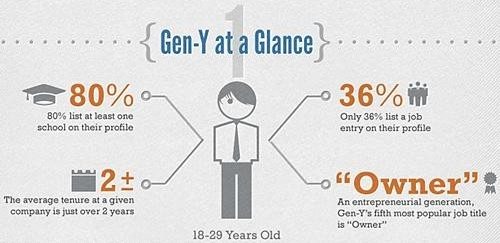Gen-Y employees are entering the workforce at astounding rates. Many of them are looking for a full-time job or simply for the perfect internship opportunity to boost their resume and embark on the journey towards a fulfilling career. However, some employers have found this group difficult to deal with due to generational gaps and miscommunication.
No one likes to see the way they are used to dealing with the workplace change so suddenly but as millennials begin to enter part of your workforce, you must realize that if you wish to remain competitive and productive, you must keep an open mind, be willing to make some changes, and clear up these common misconceptions:
1. They are only interested in making money.
While it is true Gen-Y employees are coming out of school with $1 trillion in student debt, money is not their highest motivating factor. Millennials have chosen their field of study hoping to gain a career. While money is a good incentive, chances are your Gen-Y employee is hoping to learn and grow from the opportunity you are giving him or her.
2. They are difficult to train.
Many employers make the mistake of thinking Gen-Y employees are inexperienced or need to be walked through step-by-step. They don’t want you to teach them how to do their job step-by-step. Most millennials value the joys of learning from experience. They’d rather have someone they can go to with their questions than a micro-manager holding their hand.
3. They switch jobs often because they become bored easily.
Yes, it is true on average Gen-Y employees are switching jobs every two years. However, this isn’t because they are bored or can’t find a place to settle. Keep in mind millennials grew up with tools, such as the internet, and many more opportunities to travel abroad than past generations. Gen-Y have a thirst for life, a need to experience new things and they hope to do so while they are young. (No, it’s just that they want to try more things while they still can)
4. They have no respect for leaders in the workplace.
Gen-Y did not grow up with parents who demanded to be respected. The idea that one should automatically respect superiors is alien to most Gen-Y employees. They don’t want to just mindlessly follow someone because they are told to. Instead, Gen-Y employees want to know they can trust their authority. They want to feel the person they are under is capable, hard working, and deserves his or her position. You can’t demand deeply-rooted respect from a Gen-Y employee; it’s something you must earn.
5. They will not accept constructive criticism.
It’s not that millennials can’t take yearly or monthly reviews. Most of them prefer to have praise be given on the spot, or corrections being made on the spot. They cannot fix something they are doing wrong if you do not tell them, and they hope you don’t wait until the year-end review to break the news.
6. They are self-centered.
Gen-Y were raised by a set of doting parents and were taught about self-awareness and the joys of being an individual. Yes, they may be looking out for themselves much of the time but who isn’t? Gen-Y employees are simply bolder about it. Many of the possible missteps that can arise are easily solved through ample communication.
7. They refuse to follow directions.
You’ve told your Gen-Y employee how to do something and he or she went off and did it their own way AND the wrong way. Your Gen-Y employees are used to having a vast array of options at their fingertips. They’ve been taught there’s an infinite amount of ways to get from point A to point B. While you are not to relinquish all structure and control, some flexibility and compromise is in order. Your Gen-Y employees will be more productive and serve you better if you allow them to put an individual spin on the tasks at hand.
8. They want too many commodities in the workplace.
Gen-Y employees have grown up in an environment that took lessons from the past. Their college education includes lessons on how to work more productively and that doesn’t always translate to working harder. It’s not that they expect you to provide them with a live-in mattress, but rather that they understand the downside of a 9 to 5 day. They know the loss of yield and damage to the environment that comes with commuting, or the loss of productivity that comes from separating employees with dimly-lit cubicles. It is said that by 2025, more than 75% of the workforce will be composed of millennials, this means workplaces will have to evolve into friendlier, greener, and more productive spaces that take into account both the psychological and physical well-being of their human resources.
9. They cannot be trusted to stay off social media.
In a survey conducted by Cisco, 56% of millennials said that if a company bans social media, they wouldn’t work there. Increasing productivity by banning small leisurely activities and communication devices immediately lets your workers know you don’t trust them. Compared to past generations, millennials have enjoyed higher levels of freedom in all aspects of life, so banning social media, is the equivalent of prohibiting a telephone call. Being in the work environment comes with surveillance already, and delivering results is as important to millennials as it is to other employees. Make your gen-Y employee feel like he or she cannot be trusted and their productivity will reflect it.
As a Millennial leadership speaker, I have found the most common misconceptions of Gen-Y come from the lack of communication in a multi-generational workplace. These hurdles can be overcome by holding multi-generational training with your workforce. Help them communicate with each other using terms that everyone can understand. By learning each others’ perspective, there will be less conflict in the workplace as teams will become stronger through communication.
What are some problems that you are seeing with Millennials or Gen-Y coming into the workplace?
Featured photo credit: flickr via flickr.com
















































